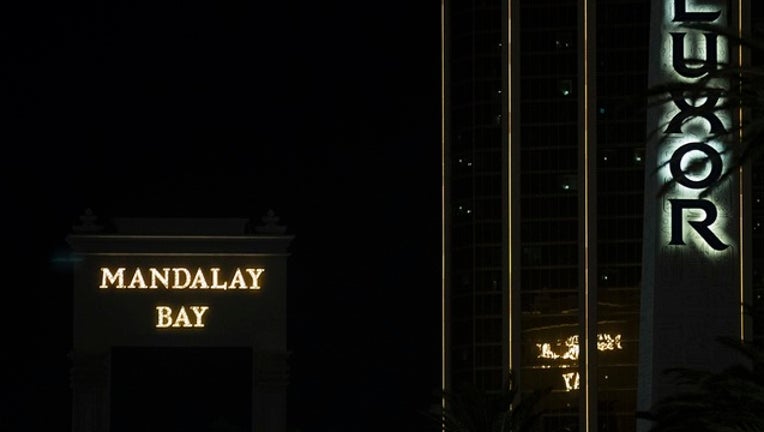Arizona man says he sold ammunition to Las Vegas shooter

Mandalay Bay Resort and Casino, site of the massacre is one of the deadliest mass shooting events in U.S. history. (Photo by Drew Angerer/Getty Images)
LAS VEGAS (AP) - An Arizona man named in court documents as a "person of interest" during the investigation of the deadliest mass shooting in modern U.S. history said Tuesday he had met the shooter one time and sold ammunition to him.
Douglas Haig told The Associated Press that he had been contacted earlier by investigators in the case.
Speaking at his suburban home in Mesa, Haig said he planned to hold a news conference later this week to answer questions about his name surfacing in the investigation.
"I am the guy who sold ammunition to Stephen Paddock," Haig said without disclosing any details. Police say Paddock was the gunman and killed himself as officers converged on him.
A law enforcement official told the AP in October that Paddock bought 1,000 rounds of tracer ammunition from a private seller he met at a Phoenix gun show. The official spoke anonymously because they weren't authorized to disclose case information. It was not immediately clear if that person was Haig.
Records show Haig owns Specialized Military Ammunition LLC. The company's website says it sold tracer and incendiary ammunition but is now "closed indefinitely."
Haig's name emerged by mistake Tuesday when court documents were released nearly four months after the shooting.
The documents did not disclose why authorities considered Haig a person of interest.
Police officials did not respond to telephone, text and email messages about Haig from AP. FBI and U.S. attorney's office spokeswomen in Las Vegas declined to comment.
The documents show that early in the investigation, police believed Paddock must have had help.
"Given the magnitude of the incident, it is reasonable to believe multiple suspects and months of planning were involved in this premeditated massacre," said one search warrant request submitted to a judge nine days after the shooting stopped.
However, Clark County Sheriff Joe Lombardo released a preliminary report on Jan. 19 saying police and the FBI believe Paddock acted alone before he killed himself as police closed in.
It did not answer the key question: What made Paddock stockpile a cache of assault-style weapons and fire for about 10 minutes out the windows of Mandalay Bay hotel-casino into a crowd of 22,000 people.
Haig's name was blacked out in the more than 270 pages of search warrant records released by a Nevada judge to The Associated Press, but remained on one page of documents provided to the Las Vegas Review-Journal.
The newspaper published the name online. Clark County District Court Judge Elissa Cadish later ordered the full document not be published without redactions, but she acknowledged she couldn't order the newspaper to retract the name.
Authorities previously said an unnamed person could face unspecified federal charges in the shooting that also injured more than 800 other people.
The warrants show that investigators found 23 rifles and a handgun in Paddock's 32nd-floor hotel suite and an adjoining room. Police also found five suitcases, five rifle cases, binoculars, a spotter scope, portable solar generator and 1,050 empty bullet casings.
Police reported finding just $273 in cash in the room of the 64-year-old retired accountant who amassed a millionaire's fortune, owned homes in Reno and Mesquite, Nevada, and earned casino perks wagering thousands of dollars on high-stakes video poker.
Authorities previously characterized Paddock as a gambler on a losing streak who was obsessed with cleanliness, may have been bipolar and was having difficulties with his live-in girlfriend.
The name of Paddock's girlfriend, Marilou Danley, was not redacted from documents released Tuesday in response to a public records lawsuit filed by media companies including AP and the Review-Journal.
Danley was in the Philippines at the time of the attack and is cooperating with investigators.
She was initially considered a person of interest but authorities later said she is not likely to face criminal charges.
Separately, Clark County District Court Judge Timothy Williams ruled Tuesday that the coroner in Las Vegas should release autopsy records of Paddock and the people killed by gunfire, with victims' names blacked out. Those documents were not immediately made public.
County Coroner John Fudenberg later released a statement later promising victims' autopsy reports "as soon as possible." But Paddock's autopsy report was not final and would not be released until it is, the coroner said.
Fudenberg maintains the records are confidential and restricts release to families and to police investigating deaths. The coroner and county attorneys didn't immediately say whether they would appeal Williams' ruling to the Nevada Supreme Court.
Margaret McLetchie, an attorney representing AP and the Review-Journal in the autopsies case, noted in court that Nevada state public records law does not directly address autopsies and that a deceased person has no legal right to privacy.
In Nevada, records are public unless the law says otherwise, she said.
___
Associated Press writers Michael Balsamo in Los Angeles; Scott Sonner in Reno, Nevada; Anita Snow in Mesa, Arizona; Alina Hartounian in Phoenix and researcher Jennifer Farrar in New York contributed to this report.

